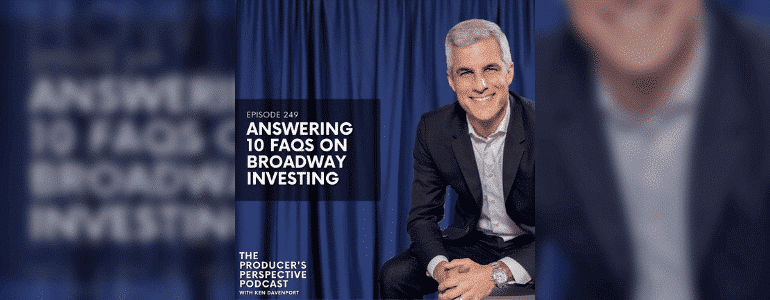10 Questions for a Broadway Pro: The voice teacher to the stars.
If you have a Ferrari, and there were suddenly some sputtering sounds coming from the inside of that V8, would you take it to the local mechanic down the block?
Heck no, you wouldn’t.
You’d take it to the best mechanic in town. It’s a Ferrari for chimney’s sake!
The same is true for the voice, which is a lot more valuable than a Ferrari, when you think about it. A great Broadway singer can earn well over the cost of a Ferrari in just a few short months.
And for singers, there’s no better mechanic in town than Liz Caplan.
I can’t tell you how many times during a tech of a show, or during a star’s illness, I’ve heard, “We need Liz Caplan,” or “Get me Liz!” Tricky music? Star new to singing? A dancer that has to learn to sing super fast?
Liz has all the tools and the tricks to make it happen. And to make it sound beautiful. You’ve heard her work all over town. Just look at some of the shows and stars she’s tuned up:
American Idiot, Wicked, Once, Book of Mormon, 13, James Blunt, The Goo Goo Dolls, Amanda Seyfriend (for the Les Miz movie), NPH (yes, that NPH) and even Stephen Colbert.
And today, Liz is answering our 10 Questions for a Broadway Pro. Take it away, Liz!
1. What is your title?
Vocal Supervisor/Vocal Coach
2. What shows are you currently working on?
As Vocal Supervisor: Once, The Book of Mormon ; As Consultant: Wicked, Chaplin, Bring it On.
3. In one sentence, describe your job.
I offer vocal training, support and maintenance to the companies of Broadway shows on which I’m on staff or a member of the creative team.
4. What skills are necessary for a person in your position?
Knowledge of vocal pedagogy is necessary. Awareness of emotional, physiological, psychological, and muscular skeletal functions adds to the palette of knowledge. Playing piano proficiently and being an excellent listener is also paramount.
5. What kind of training did you go through to get to your position?
I was a Voice major in college and studied Theater simultaneously. Over the years I have apprenticed with homeopaths, dance and movement therapists, and with many alternative practitioners. I have been working with Broadway and music industry professionals for three decades. Being fully present and doing solid work one person at a time was what made my position possible.
6. What was your first job in theatre?
Performing children’s theater during summers between college years.
7. Why do you think theater is important?
Not everyone gets to be emotional and expressive 24/7( and be paid for it). I think theater allows audiences a portal into the possibility of deeper expression and communication. Simply by being exposed to a moving theatrical experience makes the conversation possible.
8. What is your profession’s greatest challenge today?
Helping actors achieve a sense of balance is a challenge. My private studios’ motto is ‘Balancing the State of the Artist’. That balance includes giving the actors tools to keep their energies( physical and vocal) always moving fluidly and steadily. Most actors fatigue due to the 8-show a week schedule. The adrenals(responsible for releasing hormones in response to stress) take a beating if nutrition, hydration and sleep are overlooked. Singers must stay obsessively on top of their individual needs based on energy output. Broadway Companies benefit from hands on vocal work and vocal hygiene suggestions on a regular basis. Brush up sessions with the full company include healing, strengthening and preservation exercises for maintenance. They also offer group support and connection. Convincing Producers to include a Vocal Supervisor as part of the Creative Team is its own challenge. Templates based on shows vocal demands would keep everyone safe and strong. It’s an insurance policy from the beginning
9. If you could change just one thing about the industry with the wave of a magic wand, what would it be?
Going back to old school by letting the matinees of especially difficult shows( most of them at this time) be performed by an alternate. Vocal preservation, mostly due to adrenal fatigue, has become quite a challenge.
10. What advice would you give to someone who wanted to do what you do?
Immerse yourself in many different areas : music, theater, body work, nutrition, psychotherapy, movement, and most importantly, excellent people skills.
(Got a comment? I love ‘em, so comment below! Click here then scroll down to say what’s on your mind!)
——
Do you dream of being able to write, produce or direct full-time? Join my community of theater professionals on TheProducersPerspectivePRO who are all working to achieve their goals, plus get instant access to 30+ hours of training, monthly newsletters and networking opportunities, and so much more! Join TheProducersPerspectivePRO today!
Podcasting
Ken created one of the first Broadway podcasts, recording over 250 episodes over 7 years. It features interviews with A-listers in the theater about how they “made it”, including 2 Pulitzer Prize Winners, 7 Academy Award Winners and 76 Tony Award winners. Notable guests include Pasek & Paul, Kenny Leon, Lynn Ahrens and more.















